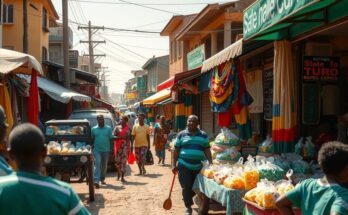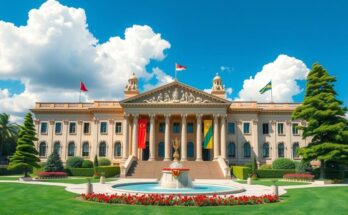The presidential election in Tunisia represents a significant point in the country’s political trajectory since President Kais Saied’s controversial rise to power. Observers perceive the electoral process as rigged, with civil liberties in steep decline and key opponents imprisoned. Saied is forecasted to secure a second term amid public disillusionment and doubts about the country’s democratic future.
The upcoming presidential election in Tunisia marks a crucial point in the nation’s political landscape since President Kais Saied took office in 2019. Saied, who ascended to power with no prior political experience, enacted a self-coup in July 2021, which led to the suspension of parliament, dismissal of the prime minister, and assumption of complete executive authority. Rights organizations have condemned his leadership due to diminishing civil liberties, freedom of speech, and a wave of arbitrary arrests directed at dissenters. Despite a backdrop of prevalent public disillusionment with established political parties, it is widely anticipated that Saied will secure a second term. Observers both domestically and internationally view the electoral process as marred by pre-established rigging. The election occurs amid Tunisia’s perceived decline from its previous status—a beacon of democratic progress following the 2011 Jasmine Revolution, which successfully ousted longtime dictator Zine El Abidine Ben Ali. Following the revolution, there was a surge in political participation by civil society, NGOs, and individual activists, creating hopes for genuine democratic governance. Prior to Saied’s takeover, Tunisia had experienced its share of turmoil, with nine unstable governments since the revolution, exacerbated by high unemployment and economic strife. Despite a chaotic political scene, significant legislative achievements such as laws criminalizing violence against women and racism were enacted. The current election, however, casts doubt over its potential for resolving Tunisia’s pressing issues. Saied faces limited competition, with only three candidates interested in the presidential position. Moreover, numerous political figures have been jailed, and the Independent High Authority for Elections (ISIE), restructured under Saied’s guidance, has raised concerns regarding its credibility. Moreover, the judiciary and press in Tunisia have been undermined since Saied’s consolidation of power, with many judges dismissed and critical voices silenced through harsh legislation. Protests have been sporadic, though some recent demonstrations have manifested against the regime’s repressive tactics. Nevertheless, these protests have largely failed to gather momentum compared to past mobilizations, suggesting a fractured civil society. In summary, the Tunisian election not only serves as a metric for Saied’s popular support but also carries significant implications for the future of democracy and civil rights in the country.
Tunisia is at a pivotal juncture with its forthcoming presidential election, the first since President Kais Saied’s controversial assumption of power derived from a self-coup in 2021. With a backdrop of diminishing civil liberties and political repression, this election symbolizes a critical phase in the country’s struggle for genuine democracy following the optimism of the Arab Spring in 2011. The political climate remains fraught with challenges stemming from previous governmental instability, public disillusionment with political parties, and the imprisonment of key political figures.
The Tunisian presidential election poses significant stakes for the nation’s burgeoning democracy. With President Kais Saied maintaining a grip on power through repressive measures, the election’s outcome could either reinforce his autocratic rule or pave the way for renewed democratic engagement. However, the current political environment—marked by widespread disillusionment, intimidation of opposition voices, and a compromised electoral process—suggests that true democratic restoration is unlikely in the immediate future.
Original Source: www.aljazeera.com




